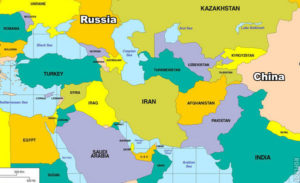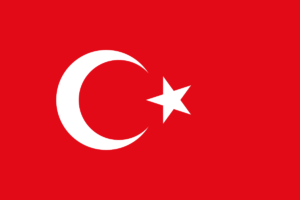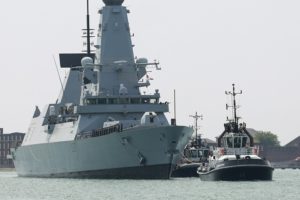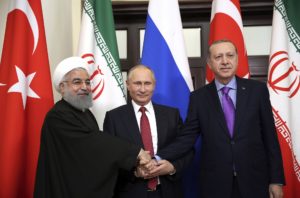
Ever since the presidency of Turkey was taken on by Recep Tayyip Erdogan the West seems to have been on a collision-course with its most valuable ally in the eastern flank of NATO. But, as so many states now seem to be electing and allowing powerful and radical leaders to take more power into their own hands, is it an inevitability that Turkey is going to turn to countries run by men such as Putin who might seem more in tune with the ethos of the quasi-dictatorship that is emerging from the grass-roots of old-fashioned Turkish Islamic beliefs?

The prospect of “losing” Turkey to a coalition of anti-Western, totalitarian states is alarming for many reasons. Turkey has one of the largest land armies in the world and it has for many years been involved in detailed NATO planning with regard to a range of potential strategic threats that could be central to the defence of Europe. The fear is that not only might a re-aligned Turkey actually become neutral at best, or even a future threat, but NATO secrets could be handed over to third parties such as Russia, or perhaps even to hard-core, fundamentalist regimes and their illegitimate satellite-militia movements.
President Trump, another putative “strong-man” has not helped matters of course. His threat of increased sanctions over the matter of Andrew Brunson, the preacher detained in Turkey, seems to British minds to be curiously heavy-handed. It is also strangely reminiscent of the situation leading up to the Japanese attack in the Pacific after the imposition of oil and other sanctions drove it to a course of action that was, in hindsight, almost inevitable.
The “preacher problem” is of course not the only issue at stake between the US and Turkey. The US supports Kurdish fighters in Syria who are allied to groups regarded as terrorists by the Turks. The US will not allow a Turkish cleric believed to be at the heart of the failed 2016 Coup, to be extradited to Turkey. And now the stakes have been increased by the near-certain purchase of the Russian advanced S-400 anti-aircraft missile system.
This last point represents a more serious problem for the US, for, according to some observers, the Russians will have technical experts embedded with the Turkish forces as they deploy the missiles and it is almost inevitable that they will gain valuable intelligence about NATO targeting and tactics as the missiles are integrated into Turkeys’ defences. However, it would appear that Trump has once again played into Putin’s hands by instructing his people to further delay a sale of F-35 aircraft to Turkey, allowing the hardliners in that country more reason to turn away from the West.
Turkey has long-complained about the fickle nature of Western arms supplies, citing many instances of deals cancelled on the grounds of Turkey’s Human Rights record – or some other similar political issues to do with entry to the European Union or migrants. In the eyes of many in Turkey, these arguments represent an attempt to corrupt Turkey’s increasingly strict Islamic ethos and take it down a road of dissolute Western values.

The noisiest “Elephant in the Room”, as far as improving recent Russo-Turkish relations is concerned, is of course Syria. However, both sides have conveniently forgotten about their respective “red-lines” which has allowed Turkey to cross Russian-controlled territory to strike at Kurdish opposition to President Assad, while Turkey has now dropped its insistence that Assad (Russia’s ally) be removed from office as part of any long-term solution to the problem.
However, there is a much larger elephant lurking in the dark corners in the form of the Black Sea. The Russian seizure of the Crimea, and the near certainty of a long-term naval presence in Syria’s Tartus Port is not going to be a comforting prospect for the Turks, whose historic sparring with old Russia often revolved around who had implicit or actual control of the Black Sea. Again, the NATO issue rears its head, for NATO forces in the form of Standing NATO Maritime Group 2 maintain a forward presence in the Black Sea in what the Russians regularly characterise as a “provocative act”. The Royal Navy are there and, in January this year, HMS Duncan, “a very capable Type 45”, was leading that force, returning to the UK in July.
As Russia expands her operations in the Black Sea and Mediterranean, Turkey must make a decision about which ally she values most. Some argue that she will court both sides, trying to take advantage of temporary climate changes in the politics of East and West. However, the Third Estate in Turkey is now the Islamic base upon which President Erdogan’s power is founded and which introduces a potential shift to one half of the Islamic Middle East. That, in turn, is being increasingly seen as a long-term struggle between a largely pro-US Saudi Arabia, and Iran, an ally of Russia.

For now, it seems that the meeting of Putin, Rouhani and Erdogan in Ankara is confirmation of Turkey’s current leanings. After all, the three countries are all being subjected to heavy US sanctions (mainly courtesy of Mr Trump), so they have a lot in common in that regard. However, Iran is encouraged by European resistance to US “bullying” and some believe that President Rouhani will be tempted to improve relations with Europe in an attempt to circumvent Mr Trump’s draconian sanctions.
Just how Erdogan squares all these circles will be anyone’s guess. It will certainly keep the pundits talking for some time to come.

Comments on Trouble with Turkey.